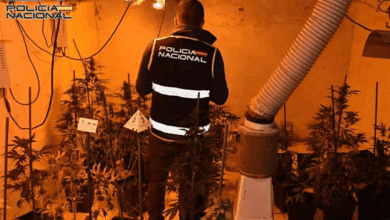
A scandal broke out in Madrid on Sunday: inside the halls of the Museo Naval, two members of the Futuro Vegetal movement staged a protest by throwing red paint on a painting dedicated to Christopher Columbus. Their act coincided with the national holiday on October 12 and was a protest against modern exploitation of natural resources and historical neocolonialism.
The left side of the painting ‘Primer homenaje a Cristóbal Colón’ by José Garnelo was affected. This work greets visitors at the very entrance to the museum. Following the incident, museum staff and invited restorers, including experts from the Prado Museum, spent the entire day attempting to save the canvas. Most of the paint was removed, but the damage remains visible: not only the varnish layer was affected, but also the gilded frame, which is sensitive to moisture.
Experts note that the red pigment has penetrated the cracks in the painting and the structure of the canvas, and some areas of the frame have lost their gilding. The painting now requires a full restoration, the timing and cost of which are still unknown, but it is already clear the expenses will be significant. Museum staff did not hide their indignation, stressing that cultural heritage belongs to society and helps us reflect on the past, even when it provokes controversy.
The activists were detained by security until the police arrived, after which they were questioned and arrested on charges of crimes against cultural heritage. During the protest, they held a banner reading, “12 October — nothing to celebrate. Eco-social justice.” According to Futuro Vegetal representatives, their actions were intended to serve as a reminder that, for many Indigenous peoples, this day symbolizes pain and loss, while also highlighting the need to acknowledge historical injustices and support reparations.
Protest organizers believe that celebrating October 12 ignores past trauma and ongoing oppression. Movement representatives called on the public to boycott and take action against companies involved in the exploitation of natural resources, as well as to reconsider attitudes toward historical dates.












